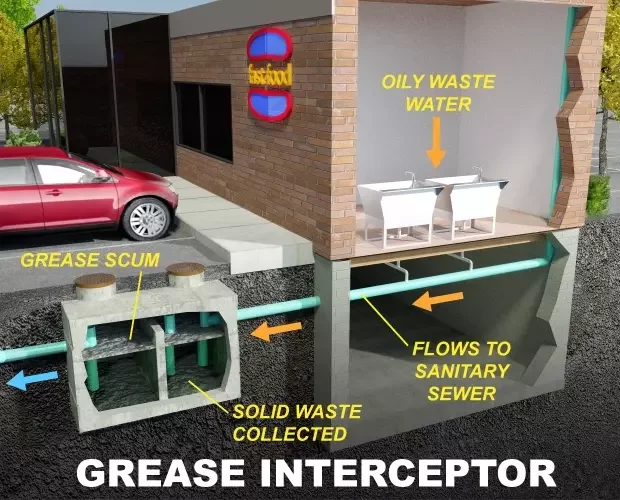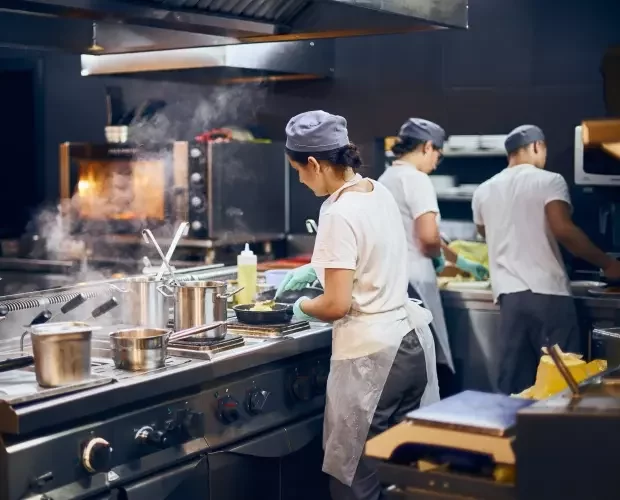Running a commercial kitchen takes a lot of planning and ongoing support. From maintaining high food hygiene standards to securing efficient equipment, details matter, especially when it comes to managing fats, oils, and grease (FOG). One of the most overlooked but indispensable components in any foodservice environment is the grease trap.
The best commercial kitchen cleaner will work with you to maintain a clean and hygienic space that is compliant and efficient, so you can manage your kitchen without disruption, and a healthy grease trap is a great way to assure this.
What is a Grease Trap?
A grease trap is a plumbing device that captures and separates fats, oils, and grease from wastewater before entering the main sewage system. When warm, the greasy water from sinks, dishwashers, and cooking equipment cools, the FOG solidifies, and serious blockages can develop in both internal pipes and public sewers, often called ‘fatbergs’.
Grease traps work by slowing the flow of wastewater and allowing the lighter grease and oil to float to the top, as heavier solids sink to the bottom. The cleaner water in the middle then flows out to the drainage system without carrying anything that could block it.

Why Are Grease Traps Important?
Enhancing kitchen safety and hygiene: Excess grease doesn’t just affect drains; it builds up on surfaces, equipment, and on floors. This becomes a slip hazard and a breeding ground for bacteria. With a grease trap, airborne grease is limited and your kitchen is kept cleaner as a result.
Preventing drain blockages: Grease will slowly deteriorate your drainage system. Without proper management, it will build up in your pipes, leading to blockages, odours, and expensive plumbing repairs. A well-maintained grease trap intercepts these substances before they can cause damage.
Protecting the environment: When grease enters the sewer system, as mentioned above, it forms ‘fatbergs’ – congealed masses of FOG and waste that can cause major issues in public sewers. Proper use of grease traps will reduce your kitchen’s environmental impact and support sustainable operations.
Maintaining compliance: Commercial drains should comply with regulations such as the Food Safety Act 1990, HACCP guidelines, and the Water Industry Act 1991. Local water authorities enforce strict rules around FOG disposal as well. Failing to install or maintain grease traps could result in hefty fines, poor hygiene ratings, or even business closure.

The Role of Regular Grease Trap Cleaning
As with any equipment, grease traps need regular maintenance. If not emptied and cleaned routinely, they can overflow, emit strong odours, and lose efficiency, defeating the purpose of having one in the first place.
At JCD Cleaning, we offer specialist commercial kitchen cleaning services for environments like restaurants, hotels, cafeterias, and other place that include grease trap cleaning, so your kitchen:
Our kitchen cleaning service follows strict cleaning protocols and keep detailed records to support your compliance documentation. We work discreetly, efficiently, and out of hours to minimise disruption to your operations and staff.
Hygiene in commercial kitchens doesn’t stop at clean countertops and grease traps though; whether you manage a busy restaurant, cafeteria, or catering facility, JCD can provide:
Grease traps are essential to the inner workings of a commercial kitchen; think of them as your first line of defence against drain disasters and hygiene issues. With a dedicated commercial kitchen cleaning company like JCD Cleaning, your kitchen will stay compliant and efficient, running safely and cleanly.